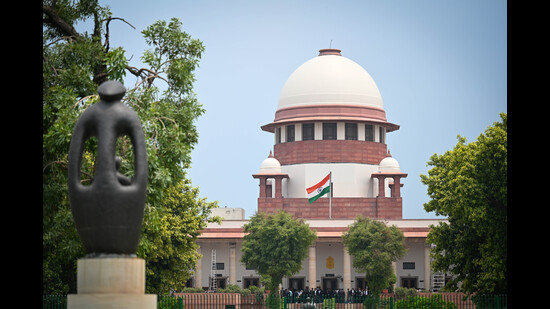Can’t detain foreigners for eternity: SC slams Assam
The court directed the Union government to submit an affidavit outlining how such cases would be handled
New Delhi The Supreme Court on Tuesday directed the Union and Assam governments to expedite the deportation of 270 foreign nationals lodged in Assam’s detention centres, asserting that holding them indefinitely was a “violation of all human rights”.

Also turning its attention to the fate of foreign nationals whose nationalities remain unknown – called “Stateless” persons -- the court directed the Union government to submit an affidavit outlining how such cases would be handled, along with details of deportations carried out so far and the procedures followed in each instance.
“You can’t have such persons detained till eternity. You have to take logical steps once they have been declared to be foreigners. It’s a violation of all human rights and international obligations to keep them detained endlessly,” remarked a bench of justices Abhay S Oka and Ujjal Bhuyan.
Hearing a batch of cases filed by individuals lodged in the detention centres or transit camps in the northeastern state, the bench set a two-week deadline for the Assam government to begin the deportation process, including sending reminders to the Centre in cases where deportation proposals were already submitted.
The bench came down heavily on the Assam government for “misleading” the court and failing to provide complete information regarding the status of these foreign nationals. It noted serious gaps in the affidavit submitted by the state, particularly its failure to disclose key details about the deportation process.
“Your affidavit is still vague. Where is the compliance with the last order? If citizenship is determined, why can’t you take steps immediately? Why can’t you start the process of deportation the moment citizenship is determined?” asked the bench, warning the state against “hiding facts” from the court.
During the hearing, the bench expressed dissatisfaction with Assam’s argument that the process for deporting 63 of the 270 detainees had not started because their foreign addresses were unknown. The court rejected this reasoning outright.
“Foreign address is not determined can never be a ground,” the bench told the counsel appearing for the Assam as well as the state chief secretary who was appearing virtually. It added: “These foreigners also have rights under Article 21, and they cannot be detained endlessly.”
The court also emphasised that Assam must immediately start the deportation process for the 63 individuals whose nationalities have been determined, regardless of whether their exact addresses are available. “You send the forms to the MEA and let them take a call. It can’t be that you will keep waiting for their addresses to be found,” it directed.
Responding to the order, Assam advocate general Devajit Saikia said: “The detainees were kept in detention centres after they were found to have entered India illegally. There’s some lack of clarity on their addresses in their country of origin as several have not disclosed them or were not found during investigation. We have mentioned about those issues before the SC and the court has given us two weeks time to file an affidavit. Any decision regarding deportation of foreigners can be taken only by the Centre. The court has asked the Centre to file an affidavit in four weeks.”
Centre ordered to explain fate of Stateless personsThe top court directed the Indian government to provide details on its handling of foreign nationals with unknown nationalities. This includes an affidavit outlining deportation procedures and a record of past deportations.
“There are two categories of persons: One, where their nationality is known, and two, where they have been declared foreign nationals by the foreign tribunals but their nationality remains unknown. The Union of India must explain how these cases will be dealt with,” said the bench, seeking an affidavit from the Centre.
Solicitor general (SG) Tushar Mehta, appearing for the Assam government, acknowledged the concerns raised by the court and assured that discussions with the ministry of external affairs (MEA) would be undertaken to address the issue. “There could be some lacuna. I will have a meeting with MEA. Give me some time to put the house in order,” Mehta said.
Senior advocates Colin Fernandes and Shadan Farasat, appearing for the detainees, pointed out that while authorities had determined that these individuals were not Indian citizens, either their nationalities were not determined or the foreign countries they were sought to be deported to have refused to accept them, rendering them “Stateless”.
Fixing February 25 as the next date of hearing, the court also stressed the need for humane conditions in detention centres. It directed Assam to set up a committee that would visit transit camps and detention centres every fortnight to ensure adequate facilities are maintained. “It is the responsibility of the state to ensure all facilities at the detention centres are properly maintained,” it held.
The latest order follows a January 30 order by another Supreme Court bench, comprising led by justice JB Pardiwala, which had similarly questioned the Centre’s decision to keep hundreds of illegal Bangladeshi immigrants in detention camps indefinitely, even after their conviction under the Foreigners Act, 1946.
That bench also expressed concern over why the Union government was not following its own guidelines, which require the deportation of illegal Bangladeshi immigrants within 30 days of being found residing in the country without authorisation.
“We would like to understand from the respondents that once an illegal immigrant from Bangladesh has been convicted for the alleged offence, is it not established that he is not a citizen of India? What is the idea in keeping hundreds of such illegal immigrants in detention camps/correctional homes for an indefinite period of time?” the January 30 order observed. This bench will take up the case on February 6 to hear the Centre’s explanation.






